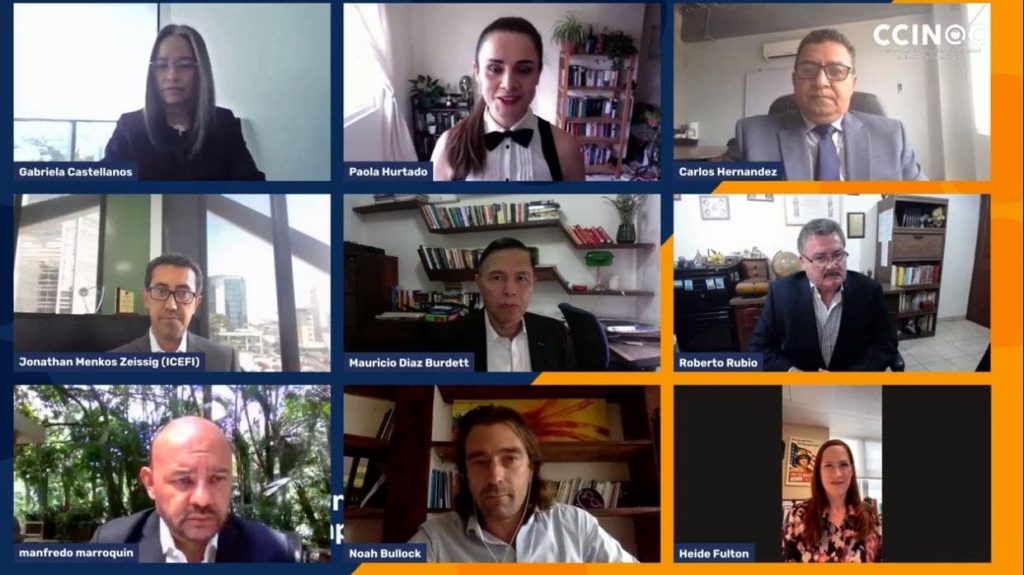Civil society organizations from Guatemala, Honduras and El Salvador recently launched the Center Against Corruption and Impunity in Northern Central America (CCINOC) in order to focus on one of the region’s biggest problems – corruption. The move coincided with recent statements by the United States about waging a “war on corruption” to curb migration there.
By Fernando Silva
On June 3, 11 civil society organizations from Guatemala, Honduras and El Salvador announced the launch of the Center Against Corruption and Impunity in Northern Central America (Centro Contra la Corrupción y la Impunidad en el Norte de Centroamérica – CCINOC). According to its web page, the center’s mission is to “fight against corruption and impunity, two of the biggest obstacles to regional development, justice, respect for human rights and equality throughout the region.”
The launch of the center comes after the demise of three anti-corruption mechanisms established in collaboration with multilateral entities: the International Commission against Impunity in Guatemala (Comisión Internacional contra la Impunidad en Guatemala – CICIG), the Support Mission against Corruption and Impunity in Honduras (Misión de Apoyo contra la Corrupción y la Impunidad en Honduras – MACCIH), and the International Commission against Impunity in El Salvador (Comisión Internacional contra la Impunidad en El Salvador – CICIES). The Bukele administration dissolved CICIES on June 4, just one day after the launch of CCINOC.
CCINOC’s Honduran member organizations are the Association for a More Just Society (Asociación por una Sociedad más Justa - ASJ), the National Anti-Corruption Council (Consejo Nacional Anticorrupción - CNA), and the Social Forum on Honduran Foreign Debt and Development (Foro Social de la Deuda Externa y Desarrollo de Honduras - FOSDEH). These organizations currently investigate and document corruption in Honduras.
“All of these organizations are involved in combating impunity, but they feel quite isolated because they have little support and are often threatened by their own governments. With governments shutting down these multilateral entities, civil society organizations are banding together so that they can continue their work and support each other,” said Eric Olson, director of policy and strategic initiatives at the Seattle International Foundation (SIF). This foundation is also a CCINOC member and is providing financial support during its start-up phase.
In an interview with Contracorriente, Olson said that since CCINOC cannot file charges and prosecute people accused of corruption, it will focus on joint investigations by its member organizations and prepare reports that can be acted upon by specialized prosecutors in each country. One of the center’s goals is to establish formal collaboration agreements with prosecutors in northern Central America.
“We want our investigative work to be useful to the governments and citizens of these three countries, and our objective is to empower citizens. We feel a responsibility and need to inform the international community, primarily the United States, but also Canada and European nations that have a presence in the region and are interested in what’s happening there,” said Olson.
Gabriela Castellanos, executive director of the National Anti-Corruption Council of Honduras (Consejo Nacional Anticorrupción – CNA), said that although CNA cannot prosecute criminal cases, it has requested the collaboration of the Ministry of Justice’s Special Anti-Corruption Prosecutor (Unidad Fiscal Especializada Contra la Corrupción – UFERCO), to ensure that corruption cases submitted to the Supreme Court (Corte Suprema de Justicia – CSJ) meet all the standards for proceeding with criminal investigations.
The dismantling of multilateral entities for combating corruption has weakened government institutions in these countries even further. The Honduran president has been linked to drug trafficking in several federal court cases tried in the Southern District of New York, where his brother was convicted and sentenced for drug trafficking. Jonathan Menkos Zeissig, director of the Central American Institute for Fiscal Studies (Instituto Centroamericano de Estudios Fiscales – ICEFI), says, “the deterioration of justice and prosecutorial institutions has been faster in El Salvador than in Guatemala and Honduras.”
Menkos says that this reached a new low on May 1 in El Salvador when the Bukele administration gained a supermajority in the Legislative Assembly, which led to the illegal dismissal of magistrates and the attorney general, as well as the cancellation of the cooperation agreement with CICIES. “The government narratives in all three countries reveal their intent to stifle social organizations that monitor the activities of public officials, especially organizations that fight against corruption and impunity,” said Menkos.
Olson acknowledges that Northern Triangle governments will not be pleased with CCINOC’s work, and the difference now, compared to past commissions, is that the member organizations are independent of the governments. “As the grassroots, we’re going to undertake the same type of work conducted by other organizations. We’re going to make them uncomfortable even though we don’t have any agreements with them,” he said.
The United States’ anti-corruption efforts
CCINOC’s launch was attended by Ricardo Zuñiga, the U.S. State Department’s Special Envoy for the Northern Triangle, who estimates that US$13 billion is lost in the region each year due to corruption. Heide Fulton, U.S. Deputy Assistant Secretary of State, wants “the people of Central America to know that we are on the side of the victims of corruption, not on the side of those who profit from it.”
These United States government officials joined the European Union and Canada in supporting CCINOC, but Heide Fulton’s participation caused some disquiet among some activists and civil society members. Fulton was the U.S. chargé d’affaires in Honduras when President Juan Orlando Hernández was reelected in 2017 amid widespread allegations of electoral fraud.
Ismael Moreno, an opposition activist and Jesuit priest in Honduras, tweeted that for the fight against corruption to be effective, Fulton must acknowledge her “active endorsement of corrupt officials and electoral fraud.” He also called on ASJ to clarify its “strong support and amity with the Hernandez administration.”
In this regard, Olson clarified that the CCINOC does not represent the United States government, and although there are differences of opinion between the CCINOC members, “we are mature enough to see that the problem of corruption is too big for any single organization to tackle, so we are willing to work together.” He said that CCINOC is not seeking to justify or defend the Hernandez administration, and that Fulton needs to answer for her own actions and statements.
“We all have different perspectives, but what fundamentally unites us is the battle against corruption and impunity,” said Olson. He stressed the need for CCINOC to maintain political independence in order to have the biggest impact. The new group also welcomes the contributions of other independent initiatives, such as the regional Anti-Corruption Task Force announced on June 7 by Vice President Kamala Harris during her visit to Guatemala and Mexico. During that visit she warned Central American migrants that they were not welcome in the United States.
The CCINOC launch coincided with the announcement of two U.S. government initiatives to stem the flow of migrants from the Northern Triangle: the creation of a joint State Department and Justice Department anti-corruption task force composed of U.S. prosecutors and experts that will investigate and prosecute corruption cases in the Northern Triangle; and a US$24 million program funded by the U.S. Agency for International Development (USAID) to develop solutions to migration, electoral and corruption issues.
To address the migration crisis, the U.S. government has shifted the focus from building a border wall to tackling the root causes of migration, including corruption.
Representative Norma J. Torres (D-CA) says that CCINOC represents the people’s determination to take back their countries and believes that its work could help stem the flow of outward migration in the region.
“They’re tired of their precious children leaving because their own governments deny them the opportunity to make a decent living at home. I continue to argue and demonstrate that we can’t solely rely on these three governments to fight corruption,” she said.
Impunity continues
Last April, Mario Zelaya, the former director of the Honduran Social Security Institute (Instituto Hondureño de Seguridad Social – IHSS), was acquitted of four charges of embezzlement of public funds and three charges of breaching official responsibilities, in relation to one of the biggest corruption cases in the country’s history. Another public official implicated in this case, the former vice-minister of public health Javier Rodolfo Pastor Vásquez, was released from prison, where he was being held for defrauding the government.
Another example of impunity was revealed in a recent Contracorriente investigation that showed how Lena Gutiérrez, former vice-president of the National Congress, and three family members managed to escape justice by severing legal relationships with a company that sold adulterated medications to the Ministry of Public Health. Yet Gutiérrez and her family still maintain close ties with this company through other businesses incorporated in Panama.
Human rights attorney Joaquín Mejía said in an interview with Radio América, “Civil society must assume responsibility for fighting corruption because the Ministry of Justice and the judicial branch are incapable of rooting out the leaders of these corrupt, criminal networks… In other words, criminal networks are the main perpetrators of corruption in Honduras, but so far neither the Ministry of Justice nor MACCIH has been able to get to the top dogs.”
The Engel List approved by the United States Congress in December 2020 is expected to be published sometime in June. The Engel List will reveal the names of individuals that have been identified as corrupt and undemocratic actors from El Salvador, Guatemala and Honduras. Individuals on this list will be subject to sanctions that include the cancellation or denial of a U.S. visa, as well as the cancellation of parole eligibility in the United States and any immigration benefits.
The dearth of justice in northern Central America has led many of its citizens to hope that the Engel List will begin the process of punishing corrupt actors in their countries, and will tangibly demonstrate that the new U.S. war on corruption is more than empty rhetoric.







